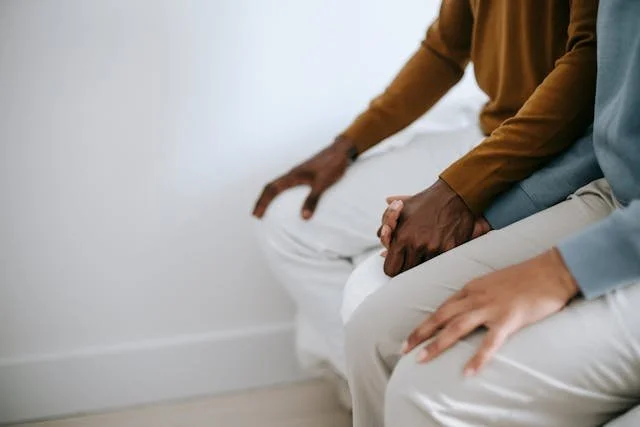
Affair Recovery
Are You Struggling To Restore Your Relationship After An Affair?
Did you recently find out that your partner cheated?
Do you feel shocked, angry, confused, and blindsided?
When you look back at your relationship now, does it feel like it was all a lie?
After getting cheated on, it’s normal to find yourself in a state of disbelief. You might suffer from PTSD symptoms like flashbacks, anger, fear, intrusive thoughts, physiological distress, and problems with concentration or sleep. Perhaps you feel hypervigilant of your partner—you’re distrustful whenever they leave the house or come home late. Deep down, you may tell yourself: This isn’t the person I thought I knew. Yet as hard as your relationship feels right now, you are still determined to make things right and restore the loving connection you once had.
If You Betrayed Your Partner, You Might Worry That You’ll Never Win Back Their Trust
Maybe you’re the one who had an affair, and now you’re plagued with feelings of guilt, shame, regret, and self-loathing. Perhaps you made the one mistake you told yourself you’d never make. Now, you find yourself doing everything you can to make your partner feel secure and win back their trust. Yet in spite of all your efforts, your partner is still jealous, hypervigilant, and easily triggered. It’s like you’re walking on eggshells whenever they’re around.
Regardless of who had the affair, you and your partner may have thought about going your separate ways. But when you consider the life you’ve built together, you know that sticking together is worth it. If this is how you feel, I encourage you to pursue infidelity counseling with me. As a therapist who specializes in helping couples rebuild trust after an affair, I’m here to tell you that recovery is possible and your relationship can come back stronger than ever before.

Many Couples Are Able To Rebound After Infidelity
Right now, you may find yourself questioning everything you thought you knew about yourself and your relationship. You are not alone. The American Association for Marriage and Family estimates that around 15 percent of married women and 25 percent of married men have had an affair.* That means that about one in every four marriages is faced with infidelity.
The good news is that infidelity doesn’t have to be the point of no return. Couples can and do recover—I’ve seen it happen many times. The road ahead may be long, but as long as you’re committing to rebuilding trust and restoring your connection, it’s possible to heal your relationship.
Affairs Often Happen In Relationships With Unclear Boundaries
Infidelity happens for any number of reasons. Sometimes we get so caught up with life’s demands that we deprioritize our relationship or simply become bored with it. We stop enjoying each other’s company and become more like roommates. Our relationship stops meeting our needs, and suddenly we find ourselves looking for quick solutions to those unmet needs—and that often means seeking solace outside of the relationship.
Although the causes of infidelity are endless, the common denominator in most cases of betrayal is unclear expectations. Many couples simply don’t discuss what constitutes cheating, especially when it comes to an emotional affair. I often hear, “My partner doesn’t view this as cheating, but I do,” or, “They think I cheated, but I don’t think I did anything that wrong.”
In this way, the line between what’s cheating and what’s not gets blurry. But the truth is that if something is causing a rift in your relationship, then it’s always best to seek help.
Recovery Is Possible—An Affair Does Not Have To Be The Nail In The Coffin
Let’s be honest: you and your partner probably wish you could just go back in time and enjoy the relationship you had before the affair. But the fact that there was infidelity means that, no matter how wonderful your relationship felt, something wasn’t right. Somewhere deep under the surface of your love, emotional disconnection lurked and needs were not fulfilled.
In therapy, my goal is to empower you and your significant other to work toward a healthier and more enriched connection than the one you had before. I’ll give you a safe and nonjudgmental space to have difficult and vulnerable conversations, helping you unpack all the issues that were previously swept under the rug and enabling you to create a more secure bond.
What To Expect In Infidelity Counseling Sessions
In the beginning, I’ll meet with you and your partner together. The purpose of this session is to explore your relationship history, your goals for therapy, and your unique story as a couple. Before meeting together again, I will hold individual sessions with each of you separately. The goal of individual sessions is not to take sides or lay blame, but to learn about your individual histories and understand your perspectives better.
As the three of us work together, I’ll help you explore the negative assumptions, reactive feelings, and unmet needs that led to infidelity. After all, one of the most common things I hear in affair counseling is, “I don’t know why I cheated.” Counseling is a chance to explore the “why,” looking at what created the kind of environment where one of you felt the need to seek out an affair.
For instance, maybe validation is hugely important to you, yet your partner has other ways of expressing love. As a result, you don’t feel appreciated in the way you want to be. Eventually, this may have driven you to seek validation outside of your relationship. In this way, we’ll look at the factors that preceded the affair—not to excuse the cheating, but to help you gain clarity on how it happened and determine how to begin the recovery process.
My Approach To Therapy After Infidelity
The two main approaches that influence my work with couples are The Gottman Method and Emotionally Focused Therapy (EFT). The goal of the Gottman Method is to give you and your partner skills and interventions for rebuilding trust, reinforcing friendship, and deepening physical and emotional intimacy.
EFT is more focused on unearthing the patterns and behaviors that fuel disconnection in your relationship. Armed with new insights, you and your partner can make shifts in the way you relate to each other. This can help you overcome jealousy, insecurities, and negative patterns of interaction.
At the moment, it may be hard to accept that your relationship as you knew it no longer exists—yet that’s a good thing. Now you have the chance to build something bigger, better, and brighter in its place. Let’s work together to create a relationship that’s rich in intimacy, friendship, and trust.

You May Have Some Questions About Affair Recovery Counseling…
Are you going to tell us if we should stay together or not?
I don’t do discernment counseling—I work with couples who have already committed to restoring their relationship or marriage after infidelity. I want to help you gain clarity on how to rebuild your connection and recover from the affair. Whether you stay together or separate is ultimately up to you.
What if counseling makes things worse?
My sessions are not venting sessions. The goal is to understand what happened so that we can strengthen and improve your relationship. If you don’t discuss what happened and simply let problems fester, your relationship can’t grow. But when you create a relationship that’s firmly planted and able to withstand any adversity, that decreases the chances of having another affair.
If I had the affair, will I be blamed and singled out?
No, you won’t. I’m not here to minimize or excuse the affair, but I’m also not here to point fingers. My focus is on figuring out how your relationship got from point A to point B, exploring what allowed the affair to take place. In that sense, our focus is on healing and rebuilding your relationship, not on taking sides.
Let’s Build A Relationship That’s Bigger, Better, And Brighter
You and your partner can’t go back in time and reverse what happened, but you can work together to create a more secure emotional bond. To learn more about infidelity therapy, you can call 954-408-8484 or use the contact form to book a free consultation.






